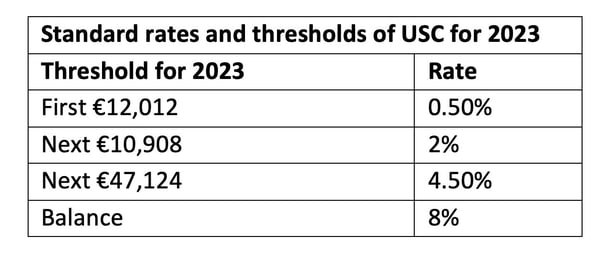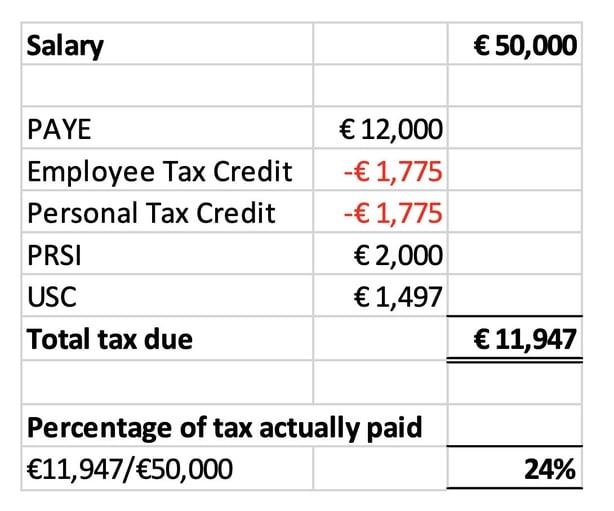Analysis: a tax consultant's guide to what your payslip says about how much tax you're paying and how it's calculated
There are only two certainties in life: death and taxes. In Ireland, we are not taught how to deal with either of these. We are brought up not to discuss death and to always complain about taxes. New college students come in every year and ask me 'will you teach us how to pay less tax?' My response is that not one of you has yet paid tax. It is a societal thing: they hear people giving out about taxes and, even though they have probably yet to pay any, they are complaining. It's not their fault. It's all they know and hear. When students begin to grow their knowledge, it is amazing how their mindset changes.
The discourse of taxes in Ireland are a combination of a lack of knowledge on the part of the general public and tax professionals overcomplicating the basics. To me, taxes are like the offside rule in soccer. If you watch the game every week, it's easy. But if you are jumping on the bandwagon and only watching one game a year, you need it explained EVERY single time. Then, some guy who is a fanatic gets too technical and starts bringing in all these exceptions to the off-side rule and loses me.
We need your consent to load this rte-player contentWe use rte-player to manage extra content that can set cookies on your device and collect data about your activity. Please review their details and accept them to load the content.Manage Preferences
From RTÉ 2fm's Louise McSharry Show, Paul Merriman from AskPaul.ie with advice for listeners on paying taxes and saving money
This is a lot like tax. The tax professionals make it overcomplicated because they know all the exceptions to the rule and deal with the subject day in and day out. They also earn their living from knowing the system. Most of us only deal with tax once a year, if at all, and we're easily confused by its 'complexities'. Like me with soccer, I'm afraid to ask the basic questions.
The aim of this article is to keep it simple and allow you understand what's on your payslip about the taxes you pay. If you're not signed up with My Account, please register right away. This is an account with Revenue where you can manage your taxes. If you're employed, even part-time, then you should have one.
PAYE – Pay As You Earn
To begin, the Irish tax year is in line with the calendar year i.e., January to December. On January 1st each year, your tax credits and bands are refreshed. For the year 2023, this is the tax paid at the 20% and 40% rates. As a single individual, anything you earn up to €40,000 is taxed at 20% and the remainder at 40%.
So if you earn €50,000 then your PAYE is as follows:
€40,000 x 20% = €8,000
€10,000 x 40% = €4,000
Total PAYE = €12,000
Tax bands and credits change annually in the budget and you'll find the current rates here.
We need your consent to load this rte-player contentWe use rte-player to manage extra content that can set cookies on your device and collect data about your activity. Please review their details and accept them to load the content.Manage Preferences
From RTÉ Radio 1's Drivetime, are you paying too much PAYE?
PRSI – Pay Related Social Insurance
If you are under 16 and over 66, you are exempt from PRSI. For 2023, the PRSI rate for employees is 4%. However, if your annual earnings are under €18,304 (€352 x 52 weeks), no PRSI is payable.
With our example of a €50,000 annual salary, that's €50,000 x 4% = €2,000
Total PRSI = €2,000
USC – Universal Social Charge
For 2023, if your income is below €13,000, you do not pay USC. If your income exceeds €13,000, then you pay USC on all your income at the following rates

For a €50,000 salary, USC is taxed as follows:
€12,012 x 0.50% = €60
€10,908 x 2% = €218
€27,080 (€50,000 - €12,012 - €10,908) x 4.5% = €1,219
Total USC = €1,497 (€60 + €218 + €1,219)
Tax credits
Tax credits are there to reduce our PAYE taxes. For 2023, there is a personal tax credit of €1,775 and an employee tax credit of €1,775. Tax credits reduce our tax liability as follows:

It can get confusing when your payslip is monthly or fortnightly or weekly, but let's keep it simple. If your payslip is done monthly or fortnightly or weekly, then divide everything by 12 months or 26 fortnights or 52 weeks.
The €40,000 tax band divided by 12 = €3,333 is taxed at 20% monthly. If you earn anything over €3,333 in that particular month, it is taxed at 40%. The tax credits €3,550 (€1,775 + €1,775) are divided by 12 so €295 is the monthly tax credit you will be given on your pay slip.
With the above example, this individual is paying an overall tax rate of 24% (€11,947 tax from €50,000 income) and not the 50% that everyone complains about. This could be reduced even further with additional tax credits. A typical individual might have further tax credits related to medical and dental costs, work-from-home, tuition fees and rent as well as pension deductions. This would reduce the tax payable even more, but these tax credits are for an explanation in another article.
Remember the key to everything in life is to understand the basics first. Get out your payslip and ensure you can work out how the figures are calculated. Your next challenge is to work out how you can pay less tax.
The views expressed here are those of the author and do not represent or reflect the views of RTÉ







